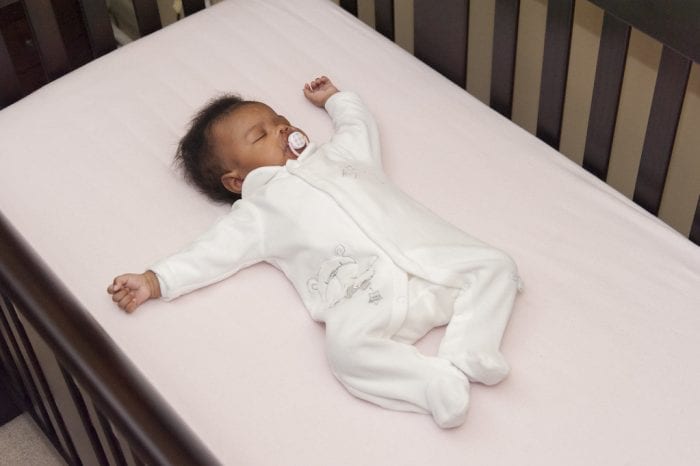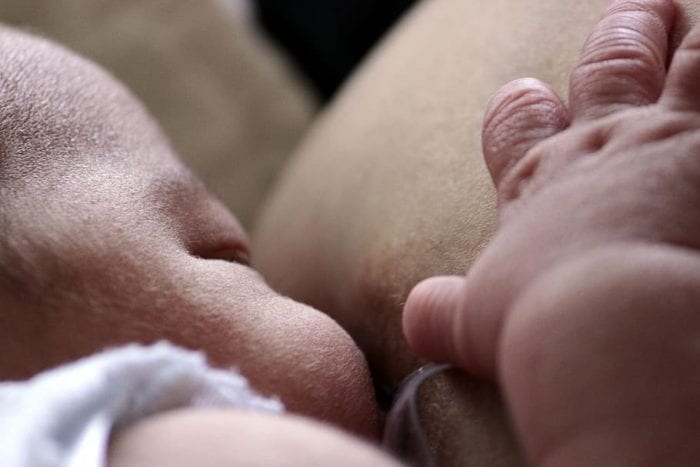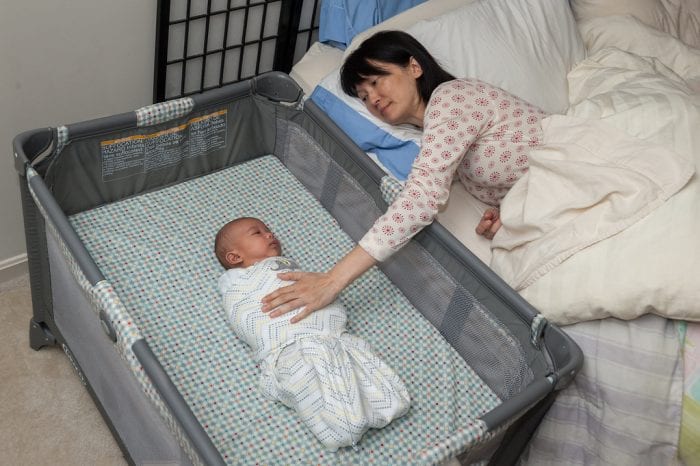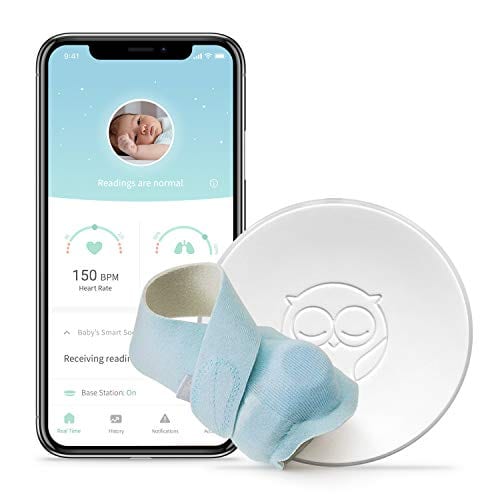When your baby rolls over in sleep face down, it can be alarming. It’s especially concerning when your baby rolls over during sleep and cries. Most parents wonder what exactly they should do. Should they let them sleep or roll them back over? According to research, parents should roll them back over, encouraging them to sleep on their back to help prevent SIDS, Sudden Infant Death Syndrome at a certain age. Later, parents should let their baby sleep in whatever position they choose.

What Is Sudden Infant Death Syndrome?
SIDS often refers to sudden infant death. Sometimes, it is referred to as crib death because babies usually die in their cribs when parents think they are sleeping. Sudden infant death may have a variety of causes, but this type of infant death is usually unexplainable. Research has concluded several things that might be linked to a sudden infant fatality.

Possible Causes Of Sudden Infant Death
According to research, there are several things that could contribute to this type of infant death. Everything from brain development to sleep positions has been studied, and the results were startling.
- Common Cold
Researchers discovered that many sudden infant fatalities may have resulted from problems breathing. During interviews, they found out that many of the babies that passed away had a cold prior to their death, signaling that their deaths may have been linked to a problem breathing.
- Brain Defects
When a child is born with brain defects, they might not arouse from sleep properly. This could cause them to not wake up when they need to, or might result in them not breathing properly in their sleep.

- Premature Birth
When babies are born premature, they are less likely to have normal automatic responses, such as breathing, than other babies. This means that they are at an increased risk for infant death syndrome. It’s important that premature babies are monitored closely to guarantee that they are able to breathe properly independently.
- Poor Sleep Environment
When babies stop breathing in their sleep or experience sudden infant death, it can be attributed to their sleep environment. There are certain things that parents should avoid to avoid suffocation, and other things that they can do to decrease the risk of SIDS.
- Put Babies To Sleep On Their Back
Babies that sleep on their stomach are at an increased risk of SIDS. It is harder for babies to breath in this position, and they are more likely to be in a position that completely restricts the flow of air, suffocating them.
Avoid Suffocation Hazards
Parents should avoid suffocation hazards to help reduce the risk of SIDS. Suffocation hazards include:
- Stuffed animals
- Pillows
- Bumper pads and other soft bedding
- Mattresses that are too soft

A babies crib mattress should not be soft enough for them to accidentally push their face into it. It also should be free of things other than the baby and a soft blanket, if the baby is older. Younger infants can sleep in a sleep sack for warmth.
However, it is important to note that babies that are overheated are at an increased risk for SIDS. Keep your little one comfortable, but make sure that they are not too hot. Babies that are too hot may be fussy, sweat or will appear redder than usual.
Co-Sleeping Should Be Done Properly
There is nothing as cozy as sleeping while you hold your little one, but this can be dangerous for babies. Co-sleeping increases the risk of SIDS, and can be a suffocation hazard. Instead, babies should be asleep in their own bed or in a co-sleeper. A co-sleeper is a little bed that is designed for the baby, and it sits on the mattress so that your baby can sleep in bed with you safely. These are the best options for parents that want to co-sleep with their baby.
Breastfeed To Reduce the Risk
Studies have concluded that breastfeeding can reduce the risk of SIDS. Premature babies and other infants that are at a higher risk of infant death syndrome should be breastfed to reduce the risk of infant death as much as possible.

When The Baby Rolls Over In Their Sleep
Parents that have infants old enough to roll over in their sleep face a few additional challenges. Babies might prefer to sleep on their stomach, which can make it difficult to keep them on their back. There are things that parents can do to minimize risk, though.
Reduce Risk Factors
If babies are in a healthy sleep environment that does not have suffocation hazards, they are not likely to experience a sudden infant fatality due to suffocation. Do everything possible to reduce the risk factor, such as still not co-sleeping and avoiding suffocation hazards in the crib.
Encourage Sleeping On Their Back
Babies should be encouraged to sleep on their back. When your infant rolls over in their sleep, gently roll them back over onto their back. Try not to wake them in this process. If they do wake up, let them lull themselves back to sleep.

Let Older Babies Sleep
Older babies that are already past the high risk period for SIDS, such as those that are 5-6 months old can be left to sleep on their stomach if they roll over in their sleep. It’s important that parents guarantee that there are not any suffocation hazards in the babies bed, though.
FAQs On Baby Rolls Over In Sleep Face Down
Although babies should sleep on their back, sometimes it is not as simple as rolling them back over once. Parents are usually full of questions about their particular situation, which is understandable.
Is it OK for babies to sleep face down?
No, babies should never sleep face down. This increases the risk of a sudden infant fatality, and is a suffocation hazard. Older babies can be left on their stomach, but turn their head so they are not sleeping face down.
How do I stop my baby from rolling over at night?
Once your little one is old enough to roll over, you can’t stop them. Swaddling them will not be safe due to the extra blankets in the crib, and some babies will simply prefer sleeping on their stomach. Put babies to sleep on their back, and roll them over once to encourage them to sleep on their back. After that, there’s nothing more you can do.

What if baby rolls on stomach while sleeping?
Let them sleep, or roll them over once to encourage them to sleep on their back.
How do I keep my baby from rolling on his side?
You can’t. Do not put blankets or other items in the babies crib to restrict movement. Instead, let the baby sleep on their side.
At what age can a baby sleep face down?
Babies can safely sleep on their stomach when they are approximately 4-6 months old.
How do I stop my baby from rolling over in bassinet?
If your baby is old enough to roll over in their bassinet, it might be time to upgrade to a crib or playpen so that they can have more space. You cannot convince a baby to stop rolling over. It is a normal part of development, and babies need to roll over.
Why is my baby always on the left side of my belly?
Your liver is located on the right side, so babies have more room to move when they head over to the left side.
How can I stop my baby from rolling over at night?
You can’t prevent your baby from rolling over. However, you can pick up a little ankle monitor that tracks heart rate and oxygen levels to give yourself peace of mind.

What do I do if my 4 month old rolls in her sleep?
Roll her back over once, but if that does not work simply let her sleep.
Can 1 year olds sleep on their stomach?
Yes, 1 year olds can safely sleep on their stomach. They can hold their head up to breath, are well past the high risk period for SIDS and are able to move around enough it might prove impossible to get them to sleep on their back.
Baby Rolls Over In Sleep Face Down Other Resources
Here are more helpful articles where you can find more relevant information about baby rolls over in sleep face down:
https://www.romper.com/p/what-happens-if-a-baby-rolls-face-down-while-sleeping-23635
https://www.healthline.com/health/baby/baby-rolling-over-in-sleep
https://sleepbaby.org/baby-sleeps-face-down/
Last Updated on May 11, 2023 by Jeanne Meets
DISCLAIMER (IMPORTANT): This information (including all text, images, audio, or other formats on FamilyHype.com) is not intended to be a substitute for informed professional advice, diagnosis, endorsement or treatment. You should not take any action or avoid taking action without consulting a qualified professional. Always seek the advice of your physician or other qualified health provider with any questions about medical conditions. Do not disregard professional medical advice or delay seeking advice or treatment because of something you have read here a FamilyHype.com.